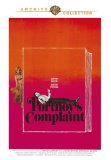| Reviews & Columns |
|
Reviews DVD TV on DVD Blu-ray 4K UHD International DVDs In Theaters Reviews by Studio Video Games Features Collector Series DVDs Easter Egg Database Interviews DVD Talk Radio Feature Articles Columns Anime Talk DVD Savant Horror DVDs The M.O.D. Squad Art House HD Talk Silent DVD
|
DVD Talk Forum |
|
|
| Resources |
|
DVD Price Search Customer Service #'s RCE Info Links |
|
Columns
|
|
|
Portnoy's Complaint (Warner Archive)
"Portnoy's Complaint: A disorder in which strongly felt ethical and altruistic impulses are perpetually warring with extreme sexual longings, often of a perverse nature..."
A few cheap, easy laughs scattered here and there for this tame, fundamentally misguided adaptation of the iconic novel. Warner Bros.' fantastic Archive Collection, the M.O.D. (manufactured on demand) service that caters to movie and TV lovers who want hard-to-find library and cult titles, has released Portnoy's Complaint, the failed 1972 adaptation of Philip Roth's seminal (sorry) novel, scripted and directed by Ernest Lehman, and starring Richard Benjamin, Karen Black, Lee Grant, Jeannie Berlin, Jack Somack, and Jill Clayburgh. Perhaps an impossible task back in '72, Lehman's double-team effort here to bring Roth's groundbreaking work to life falls flat, with the resulting glossy, safe movie playing more like a dirtied-up Doris Day or Dean Martin sex romp rather than an adaptation of a book that truly scandalized and enlightened its audience just three years prior. No extras for this lush, perfect transfer.
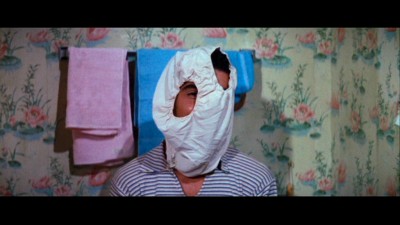
The Assistant Commissioner of Human Opportunity in New York City, Alexander Portnoy (Richard Benjamin), doesn't really want to hear about the problems of the stacked woman (Jessica Rains) in his office...he wants to picture her naked. You see, Portnoy is obsessed with obtaining pleasure, obtaining sex―with girls, with himself―it doesn't matter. And yet, he holds a secret: he's that "bad little good little Jewish boy" who's been taught to feel guilty about everything, especially sex. He just wants to find pleasure without guilt, he tells his silent Freudian analyst, Dr. Spielvogel (D.P. Barnes). Portnoy's mother, Sophie (Lee Grant), has already inextricably linked maternal love, urination, sexuality and shame during his potty training...while his father, Jack Portnoy (Jack Somack), has spent half his life in the bathroom, constipated. To say that chronic, even obsessive masturbator Portnoy is "conflicted" about his Jewish identity in a rapidly assimilating America is to put it mildly, but true anguish ironically comes when he meets what should be the solution to all his problems: The "Monkey," Mary Jane Reid (Karen Black), a shiksa who can contort in any position, and who is willing to not only sexually satisfy Portnoy in any way...but also love him. And that's when the trouble really begins for Portnoy.
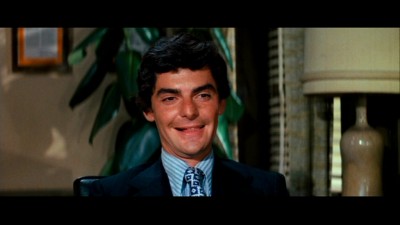
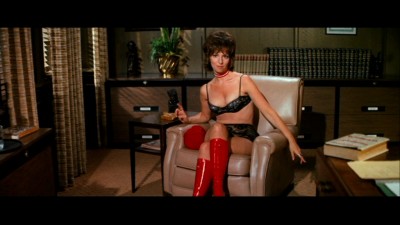
Normally when I review a movie based on a novel, I give a standard (and sincere) disclaimer that movies and books are two entirely different aesthetic objects, experienced in entirely different ways by their consumers, and that a movie, particularly one based on a controversial or best-selling novel that everyone has an opinion about, should be judged as a completely separate entity. Of course it doesn't always work out that way (I remember reviewing Minnelli's disappointing Some Came Running strictly on that comparison basis because I love Jones' book so much). With Portnoy's Complaint, however, I feel like I need to read the book again because it's such an important milestone in American literature (I read it back in college, but I'm no expert). However...who has time for that? The ugly reality is I'm backed up with movie titles to review for the next 2 months, and besides...I should just stick to my original belief: just review the movie, not the novel and the movie.
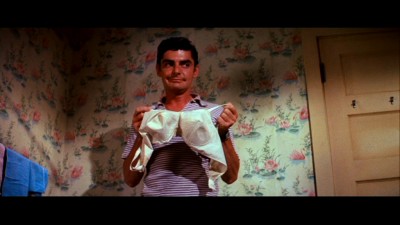
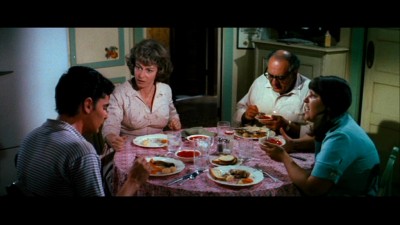
So here goes: why isn't Lehman's Portnoy's Complaint more like Roth's Portnoy's Complaint? Couldn't resist. I guess it would be easiest to blame the time frame. Certainly Warner Bros. must have assumed this was a sure-fire shot at a hit. Benjamin's earlier sojourn into Roth territory, 1969's Goodbye, Columbus, had cleaned up at the box office for Paramount, so why not adapt Roth's huge bestseller that came out the same year? By 1972, you could have a one-off "arty," "foreign," and "sort of explicit" movie like Last Tango in Paris with a iconoclastic star like Brando be a hit...but there was no way Warner Bros. was going to put out a truly X-rated "dirty movie" of Portnoy's Complaint with a comedy star like Richard Benjamin for mainstream audiences (maybe the studio thought―probably correctly―that a paperback is easy to hide in a dresser drawer, but in '72, who's going to stand on-line outside their little town's theater, right next to their neighbors, to see that filthy X-rated Portnoy's Complaint?). So while Benjamin was allowed to recite some of Roth's explicit dialogue, they weren't going to actually visualize it (the infamous masturbation scene, with a criminally wasted Jeannie Berlin, wouldn't rate a PG today). And that fact probably compromised the material right out of any true meaning, because after all, that's precisely what Roth was going for: jolting people out of their complacency while he "exposed" secrets related to his particular experiences growing up, reflected, of course, through his ethnicity and religion. How can you make a "shocking" adaptation of a movie about a Jewish boy feeling guilty about being Jewish and masturbating, when you deemphasize and de-contextualize the Jewishness...and when you don't really show the masturbating? Of course the book was about more than the mere act, but the movie certainly doesn't seem to think so.
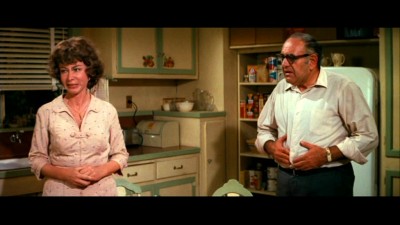

The opening scene, grotesquely mounted, pretty much confirms that aesthetic approach, both thematically and visually. Benjamin, looking like a well-groomed kosher Alfred E. Newman, leers at an actress in an artificial, overdone, too brightly-lit, too-glossy Warner Bros. studio office set, practically licking his chops as director Lehman alternates flash-shots of her topless. As it looks and plays here, it's not an approximation of, or a correlation to, Roth's work―it's the blooper reel for the Laugh-In wrap party. We then segue into composer Michel Legrand's hilarious, inappropriately lush theme music ("That was 'The Love Theme' from Portnoy's Complaint on WKRAP's Easy Listening Wrap-Up!") as Newman Benjamin walks down the street to another hermetically-sealed Warner Bros. studio set, this time to talk to his analyst (didn't someone say, "This kind of material needs some verisimilitude; it needs some grittiness, not the studio"?). This isn't the free, loose, dirty style of Roth's deliberately filthy (and illuminating) prose: it's wide, widescreen Doris Day and Rock Hudson with potty mouths and bare breasts.
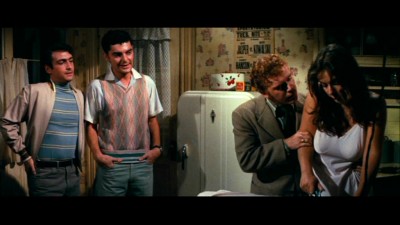
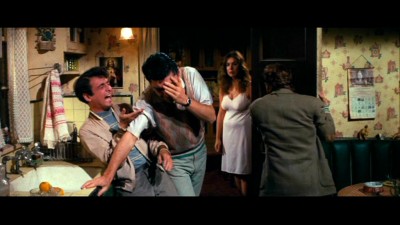
As the movie transpires, the main problem with Portnoy's Complaint seems to be one of shorthand. We assume Lehman understands Roth's themes, since we do already (by 1972, Roth's book had been thoroughly debated, while by 2012, a lot of the startlingly hilarious things Roth first had to say back in 1969 have already acquired a blasé commonplace in the pop culture). The scenes that get the biggest laughs―dinner at the Portnoys―are filled with Jewish stereotypes and gags we're more than familiar with; we get why they're funny. When Portnoy imagines seeing his family at temple, his mother slicing a Jewish rye, his father eating All-Bran®, and his sister wearing a bra, we get the joke. In Roth's book, those kinds of jokes are contextual, though; here in the movie, they're merely visual punchlines, because the movie doesn't try to explain any of them through Roth's complex themes of Jewish identity, assimilation, intellectualism and class envy (I remember at least that much from Goodbye, Columbus and Five Short Stories).

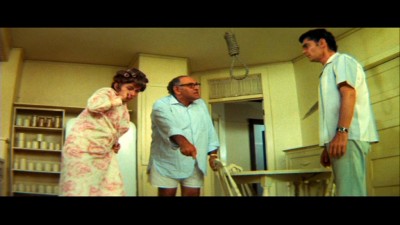
When Lehman has Benjamin reciting what sounds like a monologue right out of the book (because it's better than anything I've ever heard from Lehman), it's beautifully funny, but ironically it isolates the viewer even more because it's so out of step with the rest of the movie. This scene, where Portnoy sits up in bed and tells Monkey about his various masturbation techniques, isn't moviemaking, it's recitation. Lehman pulls the camera back and grinds away as Benjamin delivers a monologue. At least the admittedly shallow Jewish family jokes are stabs at moviemaking (Lehman's blocking and framing are hopeless...but at least people are moving around in these scenes). By the time Black is angrily calling Benjamin ethnic slurs, and Benjamin is trying to rape Communist kabutz Israeli Clayburgh, the viewer is saying, "Where did that come from?"―not because they don't understand the end result, but because Lehman has made no attempt to explain how these scenes built to those points. Lehman's crude, butchering shorthand has eviscerated Roth's carefully constructed framework, leaving us (hopefully) to fill in the blanks for Lehman's cheap, easy generalizing. And when he does lay it all out there, in the final dream sequence where good actor Benjamin, misjudging badly in a whiny, ugly wrap-up, the results are laughably obvious. Maybe that's why Portnoy's Complaint is still considered a masterpiece...and Portnoy's Complaint is a completely forgotten disaster.

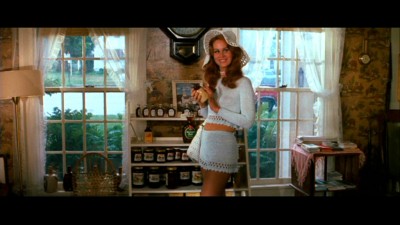
The DVD:
The Video:
The anamorphically-enhanced, 2.4:1 widescreen transfer for Portnoy's Complaint is pristine, with gorgeous color values, a sharp, sharp image, and no imperfections. Beautiful.
The Audio:
The Dolby Digital English mono audio track is quite clean, with no hiss and a nice re-recording level. No closed-captions or subtitles.
The Extras:
No extras for Portnoy's Complaint.
Final Thoughts:
Compromised from the get-go. I don't think any novel is impossible to film...although some books seem that way (The Great Gatsby is the perfect example). But clearly Warner Bros.' wasn't going to really let go with this one, nor was scripter/director Ernest Lehman, despite his resume, up to the task of adapting Philip Roth's hysterically funny, filthily honest (or honestly filthy?) novel. A colossal misfire that plays depressingly small and impotent (sorry, last one). You can safely skip Portnoy's Complaint.
Paul Mavis is an internationally published movie and television historian, a member of the Online Film Critics Society, and the author of The Espionage Filmography.


|
| Popular Reviews |
| Sponsored Links |
|
|
| Sponsored Links |
|
|
| Release List | Reviews | Shop | Newsletter | Forum | DVD Giveaways | Blu-Ray | Advertise |
|
Copyright 2024 DVDTalk.com All Rights Reserved. Legal Info, Privacy Policy, Terms of Use,
Manage Preferences,
Your Privacy Choices | |||||||









